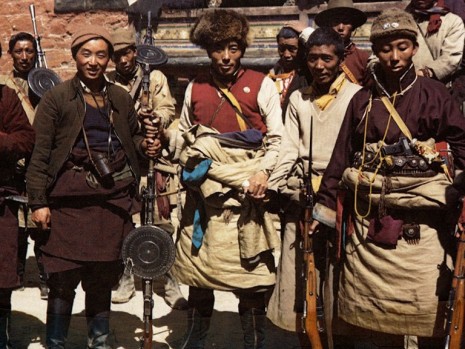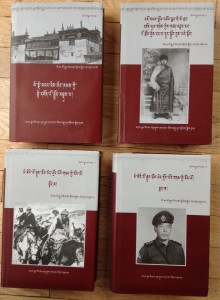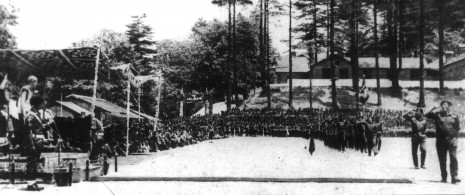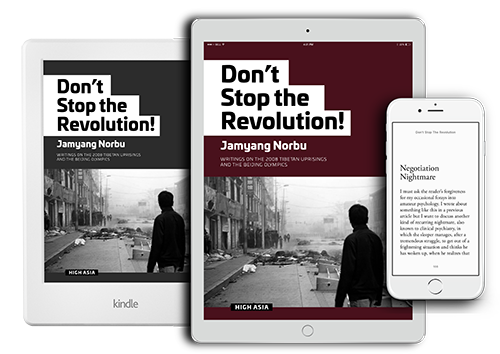
I first met him when I was researching my play YUNRU, about the Khampa chieftain Yunru Pon Sonam Wangyal, who died defending the great monastery of Lithang (Lithang Gonchen). Someone told me that I would probably get some help from this Lithangwa who was running the Chushi-Gangdruk office at the Kailash Hotel in McLeod Ganj.
Ratu Ngawang la invited me into his office and listened to what I had to say. He told me he was not the best person to answer my questions as he was in Lhasa at the time of the Lithang Uprising, but that his brother Tamdin Tashi had been in the monastery and I should talk to him. Conveniently for me Tamdin Tashi was the manager of the Kailash Hotel and he gave me all the information I needed. Ngawang la lent me a rare black and white photograph of Lithang monastery on which I based the dark cutout silhouette of the Gonchen and the surrounding mountains that I positioned before a dramatic cyclorama sky; all of which helped to make the play “a roaring success” as a review by Thupten Samphel la in the Tibetan Bulletin declared.
“Some years later I interviewed Ngawang la about his own life and involvement in the Chushi-Gangdruk (Four Rivers Six Ranges) resistance force. He was born in 1926 in southern Lithang in Rawa-dangla to a sama-drok (mixed agro-pastoralist) family of five brothers and one sister. He joined Lithang monastery as a boy and was later appointed a chiso or business manager of his college, the Shiba Khamtsen. His business ventures finally brought him to Lhasa where he met Andrug Gonpo Tashi. The rest as they say is history: becoming one of Gonpo Tashi’s trusted commanders, setting up the Driguthang base, going on the epic ride north across the Jhanthang, endlessly battling superior Chinese forces, escaping and rejoining the Lhoka base, and finally, laying seige to the principal Chinese garrison in southern Tibet at Tsetang. The last undertaking was critical in enabling the safe escape of the Dalai Lama and so many other Tibetans.
But I need not go into details of Ngawang la’s incredible story here. It is all in his autobiography – whose genesis has a little story of its own. During my interviews, which were often long and tiring for him, he one day complained that I should help him write and publish his own life story. I said I could do that for him, and told him I would consult my fellow director of Anmye Machen Insititute (AMI), the great scholar Tashi Tsering, and we could work something out. Ngawang la felt I was trying to pass the buck and protested. Finally his wife Dechen la stepped in and told him he should stop being contrary and trust me and AMI to do right by him. Tashi la took charge of the project and arranged to have a full-time editor sit down with Ratuk Ngawang in their own office room at AMI. It took a long time and lots of hard work but finally four volumes were published in 2006.

The first volume is an account of the land and history of Lithang with descriptions of the famous monasteries and religious personalities. The second volume chronicles the 1956 Uprising in Lithang and its causes and consequences. The third volume (592 pages) is the full account of the creation of the Chushi-Gangdruk and its many struggles, battles and victories. The fourth volume recounts Ngawang la’s career as the dapon or commanding officer of the Special Frontier Force in India and the substantial contribution that he and his men made to the liberation of Bangdesh in 1971. There is a wonderful photograph of the Dalai Lama reviewing SFF troops at their Victory Parade at Chakrata. Dapon Ratuk Ngawang, six foot plus of Tibetan manhood, eyes right and holding a smart salute, is leading the march past.
The books are hardcover with nicely designed dust jackets and contain many rare photographs and maps. To get a full idea of the life of this Tibetan warrior and I would urge Tibetans to buy this four-volume set from Amnye Machen Instititute (McLeod Ganj, 176219, HP India). Copies can be had directly from Ratuk Ngawang la’s family in Majnu ka Tila in Delhi and also his daughter in New York.
I cannot stress how important it is for all Tibetans to own these four volumes. It is an encylopaediac account of Lithang, the land, the people and the great monastery, and also the orgin story of the Tibetan Uprising and resistance. It is also the Homeric account of the life, adventure struggles and battles, of an authentic warrior – and someone who looked the part.
He was well over six feet tall as I mentioned earlier, and good-looking in a rugged way. A young princess of Sikkim (which one exactly need not concern us here) was head over heels in love with him. Tibetan ladies in Darjeeling in the sixties referred to him as “Khampa Handsome” and probably sighed as he walked passed them on the Mall Road in Chowrastha.
He passed away peacefully in his sleep on the night of February 7th. Indian journalist and indomitable Tibet supporter, Vijay Kranti attended the funeral in Delhi. In his obituary post he mentioned that though many Tibetans attended the funeral, including representatives of the Tibetan Youth Congress, Tibetan Women’s Association and the Tibetan National Congress “… it is strange that the only representative from the Government (exile) of Tibet was an officer from its Security Department. The Kashag (Cabinet), the Parliament (Chitue) and the Private Office of HH the Dalai Lama were conspicuous by their absence.”
Considering the craven policy of surrender to China that these absent Tibetan VIPS represented, perhaps it was better they stayed away altogether from the funeral of a man who had taken up arms for the freedom and independence of Tibet. The irony, otherwise, would have been intolerable.
Ratuk Ngawang la is survived by his beautiful wife, Dechen Wangmo la, one of the first women combat paratroopers in Tibetan military history, and their four great children.
I would have liked to conclude with a line or a verse from the Gesar drung, but I am, regretfully, not that familiar with the great epic. Perhaps the dying words of a warrior from another saga might serve: “My eyes darken … I go to my fathers, in whose mighty company I shall now not feel ashamed.”




Fantastic piece !
Terrific tribute to a great man, Jamyang. I love the quote at the end. How true.
“Considering the craven policy of surrender to China that these absent Tibetan VIPS represented, perhaps it was better they stayed away altogether from the funeral of a man who had taken up arms for the freedom and independence of Tibet. The irony, otherwise, would have been intolerable.”
Couldn’t have said it better myself.
Great!
Will ever let the fire die!
Thanks Jamyang la
Ever = never
Thanks for the befitting tribute to this illustrious figure who stood tall throughout his life’s rough weathered journey. I personally had had on few occasions the opportunity to interview Ngawang la, and felt mesmerized by the jovial and the warmth in his personality despite going through so much in life. A true greatness of a warrior is not marked by the amount of tribute or how one dies, it’s about how one lived. During one of the interviews he expressed contentment on how life has been for him with his ever smiling signature nature, not showing any sign of regret for the otherwise poor treatment these warriors received often due to petty political upheavals in our political setup. This true great man lived well and served Tibetan cause well. The Dalai Lama often referred to him as “My Makpon.”
Belatedly, I have very fond and nostalgic memories of my visit to Dharamshala in the late 1990s and my conversations, some of them revolving around Chushi-Gangdruk, with Jamyang and Tashi Tsering at the Amnye Machen Instititute in McLeod Ganj—two of the smartest, loveliest people I have ever met.
Thank you for the piece Jamyang la. Very fitting quote at the conclusion. I don’t pretend to have known him well but met him years go in India and he seemed like a man with strong character. My condolence to his family.
To Ratu Ngawang
My first contact with Dapon Ratu Ngwang was at his office in Chakrata around 1976. I had completed the six months compulsory military training and wanted to be discharged but had no contacts or a letter of recommendation releasing me from military duties. Most of my co-trainee’s had left Chakrata and were back in civvies before I could say, “Joh Rimpo…” and I was left high and dry with no friends and soon to be shipped off to Lhadak to join my new unit. I was upset and disappointed and vowed to meet the Dapon in charge to acquire my release forthwith. I was not willing to serve in an army that was not going to fight for my country, although naively hoped that the propaganda feed to us before joining would come real, proved to be total horse-shit.
I entered the office and asked the desk clerk to meet with the officer in Charge. Luckily, Dapon Ratu Ngawang was in his office and I was ushered in. Upon entering he said “What do you want?” in his strong Lithang accent. So I went ahead with my request to be released from the army immediately. To which he gave me the usual Dharsamsala lines, why I shouldn’t leave and that the army was a good job opportunity; you can help Tibet staying in with the SFF(whatever that logic meant); you are not married you don’t have a family etc., etc.
My points were that I am not willing to fight for India or any other country except for Tibet. That I was promised an honorable release at the end of my six month training and this was confirmed by HH during our mass audience in Dharsamsala before we joined SFF.
Unfortunately for me he was having none of it, however, I had a feeling that he understood my anxiety and predicament. I was rude and insubordinate and argued with him like a street vendor losing a deal. In the end he held up his right-hand and showed me his out stretched thumb and index finger and quoted the Tibetan saying, “Tho gang logi-maray”. So I left his office without saluting him.
Judging from how he treated me, I have come to realize that he was no ordinary man. It was his prerogative to have me punished or imprisoned me for insubordination but he chose the moral high ground and elected to ignore the situation. In a sense, he seemed to have realized that he a warrior was stuck in situation where he was serving a country that wasn’t his but had no other choice and here was an angry young man putting to words what he could not say publicly.
Although I have never met him since then, I do believe I owe him an apology and to thank him for his kindness and understanding. I convey my heartfelt condolences to those near and dear to him that survive.
And to the great Khampa warrior on his last journey, Kyi Hi Hi!
Wow, quite the cathartic discharge. A touching tribute Gyalpot la.
As part of the family, allow me to say a few words about Ngawang la. The most impressive thing about Aku la, in my mind is that, as much a devout religious person as he was, he was quite open to modern ideas and criticism of religion and did not hesitate to acknowledge hypocrisies in our culture when pointed out.
One of his battle stories (among the many he shared with me) moved me very much. And looking back I now realize how much that incident must have affected his whole life. It was somewhere near Tsetang (I think); their group of Khampa warriors had ambushed a Chinese convoy. After an intense fire-fight they were quite sure most of the Chinese soldiers were dead except for one who kept firing at them. After few long minutes the firing from the convoy stopped as the Chinese soldier ran out of ammo. When they looked over their cover, they could see the silhouette of the person. He was lying on the ground and seemed to have been injured as he was trying to drag himself towards the nearby truck. Ngawang la and a couple of soldiers started to walk towards the truck, they found the injured Chinese soldier lying face down. They turned the body over and found themselves looking at a very young and beautiful Chinese girl. As the rule of guerilla warfare they can’t leave her there as she can give vital information about their strength and location to the Chinese reinforcement that was soon to follow. And it was out of the question to take her with them as prisoner. So they had no choice but to execute her and as the leader of the group Ngawang la was the one who had to make the call and pull the trigger as the others refused.
He said that he still see the girl’s face sometimes and with his eyes closed said, “Om Mani Pad Mein Hoong”. I didn’t had any word to say after that.
Can’t have enough of those epic stories of resistance by the great Chushi-Gangdruk and their brave resistance force. My dad hailed from Kham region and grew up as a young boy at that time. I grew up listening to many such incredible stories of resistance by those brave Khampas.
I have a lot of respect for those brave men.
@KP: You Aku is honest to criticism in Tibetan culture, but he also displayed hypocrisy of worst kind by killing “beautiful” Chinese girl, but saying “Om mani Pedme Hum” as a prayer for her and to exonerate himself from his sin! Maybe, he regretted not taking the girl and had some fun as many of members of Chushi Gangdru did with Himalayan ladies on Nepalese side of range! Human beings are capable of anything!
NG
A Very Befitting Tribute to Ratuk Ngawang. I have Great Respect for This Hero of Tibet. Will sure get these books and read. Thanks.
We are nation of sovereignty until Chinese invasion of Tibet in 1959. We are Tibetan not Chinese. Nobody can change it. Many man and woman have sacrificed their life for their people and the country. Every Tibetan knows this and every Tibetan is thankful for our heroes. Unlike modern day Rangzen wala whose ambition is only to attack ourselves, true freedom fighters are great people.
His Excellancy WHITE , the moron wrote:
” We are nation of sovereignty until Chinese invasion of Tibet in 1959.”
What does this mean? Does it make any sense ? This just shows that this guy do not have even a high school education. Yet, he is here to pass judgement on our patriots. F you.
@White: Chinese attacked Tibet in 1950 and in 1959 Tibetan govt just woke up when China has swallowed it.
In 1950’s Reting, Tadrak and Kudrags kept messing up to capture power for their personal benefits.
In 2016, the manchurian China man Lobsang Sangay is fooling people with lot of meaningless sing song slogans to capture power for himself and his benefactors, cheered by idiots like whites. I intentionally used plural for white to convey how keeping people ignorant or not imparting real/ full education is costing us now, with clowns fooling the idiots.
In China News Media becomes party propaganda department
http://www.nytimes.com/2016/02/23/world/asia/china-media-policy-xi-jinping.html?smid=tw-share
Tibet Post International article: “I can never give up the cause of Tibet”- His Holiness the Dalai Lama.
“I’m also a Tibetan,” he said, “and since I’ve been nurtured by Tibetans since I was small, I can never give up the cause of Tibet,” His Holiness said.
My tears came flowing, unstoppable for a long time. Kundun is the centre of Universe for every Tibetan. People, please stop using HIM for your personal gains.
TCL
19 TCL
You made me come in tears
something that should be making the Tibetans think and deserve these to be recorded in the genius book of world record. 150 Tibetans self immolated and HHDL is silent. HHDl never grants interviews to the Tibetan media